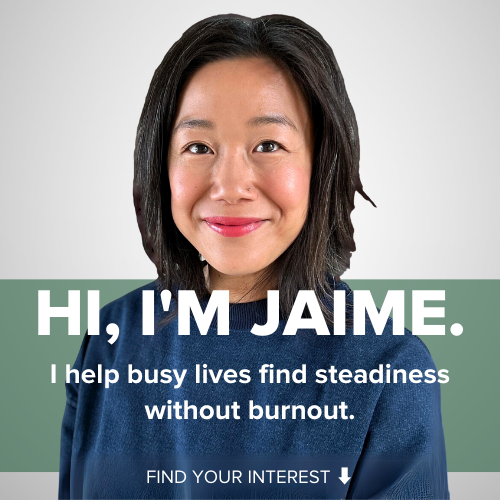NOT Losing Weight but Eating Healthy and Exercising? (WHY + HOW to fix this!)
/So you’re eating super healthy, you’re working out and keeping fit, but why are you still putting on weight? In today’s video, I’ll share with you not only why you’re STILL putting on weight even though you’re reducing what you eat and working out like crazy… I’ll explain why the very things you’re doing in an attempt to lose weight are actually resulting in the opposite effect: it’s making you PUT ON weight!
No time to watch the 10-minute video? Read the transcript below!
Subscribe to my YouTube channel to be notified when my weekly videos drop.
Traditionally we’ve been taught that it’s about calorie-restriction: calories-in and calories-out, right? If you eat less and train more - you SHOULD be using up way more energy and hence losing weight… but that’s only one part of the story… especially if you’re living a busy, full-on life, feel like you’re on the edge of burning out; if you are getting a little bit older… moving into your 30s or 40s and your metabolism and hormones are changing…
TRUTH BOMB: calorie-restriction will only work for you in the short-term.
If you want long-term weight loss and good health in general, we need to talk about your hormones and stress levels. Especially if you’re in a constant state of high stress - no matter what you’re eating and how you’re training, you will find it harder and harder to lose weight. I’ll explain why but more importantly HOW to change this.
Read till the end as I’ll give you 4 bonus tips on how you can make it easier to lose weight, especially when it’s stress-related weight gain!
Check my previous video on WHAT to eat to help you reduce stress - which could also help you with weight loss, believe it or not. So if you’re looking forward to this, give this video a like!
More Myths:
In my video next week, I’ll also be talking about another myth:
Why too much cardio or high intensity training is NOT the answer to weight loss, especially if you’re also highly stressed.
Hit the red subscribe button to follow this YouTube channel, so you’re notified when my next video comes out.
Science Crash Course
Before we get down to it, we first need a small crash-course in science.
Especially because I help wellness clients with managing stress, I’m looking at this from how our stress hormones affect all the other hormones especially the connection between cortisol, our main stress hormone and insulin - a hormone that helps our body absorb sugar (or glucose) from carbohydrates and stores it as fat.
So you’re getting the hint: the higher your insulin levels, the more likely your weight gain.
Cortisol is your body’s main stress hormone that controls mood, motivation and fear. Think of it as your body’s built-in alarm. There are so many vital processes it plays a role in, but we’ll simplify it down to its role in regulating blood-sugar and metabolism for the sake of today’s video when we’re talking about weight loss.
What Happens When You’re Stressed and How Does That Cause Weight Gain?
Chronic high cortisol levels lead to increased blood-sugar levels.
Insulin is released in response to increased blood-sugar levels to help your body absorb the sugar (or glucose).
Chronically high insulin levels cause your body to become insulin-resistant. And it’s totally upside down because even though you’ve got high insulin running through you, your body doesn’t recognise it because it’s resistant to it, and so it keeps producing even more insulin - leading to increased hunger (therefore all your food cravings), increased blood pressure and weight gain (especially around the belly).
As you can see, over time, the high stress that leads to high blood-sugar levels and therefore high insulin and the resulting insulin-resistance, starts to lead you to the downward spiral that not only causes you to gain weight (especially around the belly)... this is the start of metabolic syndrome, which can then spiral into Type 2 Diabetes in the worse case scenario.
Because: STRESS!
So think about it. If you’ve been keeping up your healthy eating and working out, but wondering why you’re starting to gain weight… start to check in and see if you’re in a constant state of high stress… exhausted and depleted - because you really need to address that too.
Check my previous videos on the 13 practical tips to stress management as well as what to eat to help you reduce stress - because believe it or not, these can really help you put the brakes on gaining weight.
4 Ways to Change This Vicious Cycle
Now that you understand this vicious cycle in very simplified terms of what happens between cortisol and insulin, what can you do about it?
1. Reduce Stress!
If I hadn’t made it clear enough - you really need to get a handle on managing your stress levels or how you respond to stress. When you lower your cortisol levels, you’ll lower your blood-sugar levels too.
Check these previous videos or some of my guided meditations to help you better deal with everything you’ve got going on.
2. Eat Low-Carb Foods
Carbohydrates are turned into glucose or sugar in the body, and as we determined, an increase in this leads to higher blood-sugar levels which in turn leads to higher insulin levels.
This does not mean ALL carbs are terrible.
We NEED carbs - but the complex kind of carbohydrates with fibre. Think of fruit, veggies and whole grains.
You really want to avoid the simple carbohydrates like the white bread/ white pasta/ white rice/ all that junk, processed food out of a box. These have minimal fibre in them and go straight to raising blood-sugar levels.
NOTE: if you’re suffering from any kind of adrenal fatigue where you’re exhausted and depleted - I do not recommend a ketogenic diet, as they cause a rise in cortisol levels, adding to the disregulation of your cortisol levels - but that’s a topic for another video.
Let’s just keep it low-carb, and only complex carbs for now.
3. Time-Restricted Eating
This is a gentler form of intermittent fasting, where you’re increasing the fasting time between your last meal of the day, typically dinner and your first meal of the day, typically breakfast.
Again - do this one with caution, coz if you’re in stage 2 or 3 of adrenal fatigue, where you’re just completely wiped out - this method may not be right for you.
Since eating anything increases blood-sugar levels and therefore insulin levels, the idea is if you can extend the time where you’re not eating typically from 10 or 12 up to 16 or 18 hours between dinner and breakfast, you’re helping to lower your overall insulin levels.
If you’re trying this one out, do watch out for whether or not your energy levels start to spike and crash and fluctuate throughout the day. They shouldn’t.
And if they do - you might like to work with a nutritionist or health coach to really take you through this step-by-step and safely. Especially if you’re living a chronically high stress life.
When implemented correctly, taking into account all the other things you’ve got going on in your life, time-restricted eating can really help you feel better and lose weight while you’re at it.
4. Move More
Exercise and regular movement helps to re-regulate both your cortisol and insulin levels.
Exercise increases sensitivity of muscles to insulin. Exercise causes you to need less insulin to take up the same amount of glucose.
Exercise also allows muscles to use glucose without the need for insulin.
So you want to ensure regular movement throughout your day, and not JUST that 1-hour workout for the day.
How many more steps can you take in every hour? Use your smartphone’s health app to track your steps, or a Fitbit or Apple Watch to really become aware of increasing your hour-to-hour movement.
In my next video, I take you through why your cardio or high intensity training could be keeping you in a high-stress state, unable to lose weight.
Need More Help?
If you need more guidance on how to lose weight, especially when you’re managing a busy, full-on life, this is exactly what I help people with in my 12-week program.
We go through the 3 pillars of mind, body, soul - managing your stress levels through working on your mental, physical and emotional wellbeing. Which results in long-term, healthier weight loss without calorie-counting, without yo-yo dieting.
I offer a free session to help you figure out how to personalise what to eat, how to move and other lifestyle rituals that can help support your busy, stressful life.
So there you go. Why you’re not losing weight and what to do about it.
Questions? Comments? Ask me! Or tell me below.








